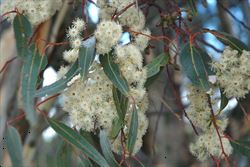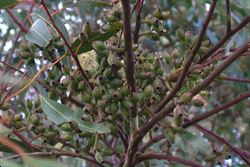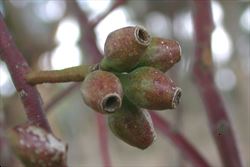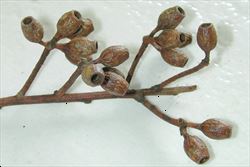Click on images to enlarge

habit (Photo: Rob and Fiona Richardson)

bark on main trunk (Photo: Rob and Fiona Richardson)

leaves and flower clusters (Photo: Rob and Fiona Richardson)

leaves and flower clusters (Photo: Rob and Fiona Richardson)

close-up of flowers (Photo: Rob and Fiona Richardson)

clusters of immature fruit (Photo: Rob and Fiona Richardson)

close-up of immature fruit (Photo: Rob and Fiona Richardson)

close-up of mature fruit (Photo: Forest and Kim Starr, USGS)
Scientific Name
Eucalyptus cladocalyx F. Muell.
Synonyms
Eucalyptus corynocalyx F. Muell.Eucalyptus langii Maiden & Blakely
Family
Myrtaceae
Common Names
sugar gum
Origin
Native to some parts of south-eastern South Australia. It has a disjunct distribution and is found naturally on the lower Eyre Peninsula, on Kangaroo Island and in the Flinders Ranges.
Naturalised Distribution
This species is naturalised in south-western Western Australia, in southern Victoria, and beyond its native range in some parts of south-eastern South Australia.
Also naturalised overseas in southern Africa, south-western USA (i.e. California) and Hawaii.
Notes
Sugar gum (Eucalyptus cladocalyx) has been widely planted beyond its native range in southern Australia, as either an ornamental tree, a windbreak or in timber plantations. It has escaped from many of these plantings and is now regarded as an environmental weed in Victoria, Western Australia and parts of South Australia beyond its native range.
Small populations of sugar gum (Eucalyptus cladocalyx) are naturalised in many parts of Victoria (e.g. near Connewarre on the Bellarine Peninsula) and this species is thought to pose a serious risk to lowland grasslands, grassy woodlands, dry sclerophyll forests, riparian vegetation and rocky outcrop vegetation in this state.
In Western Australia, sugar gum (Eucalyptus cladocalyx) has become naturalised near Perth (e.g. at Pelican Point on the Swan River estuary) and is invading bushland near Esperance. It was also recently ranked as a moderately important environmental weed in the Environmental Weed Strategy of Western Australia, due to its ability to change the structure, composition and function of native ecosystems. Sugar gum (Eucalyptus cladocalyx) is also listed as a common environmental weed of the Adelaide region, and is regarded as being invasive in the Mount Lofty Ranges in south-eastern South Australia.

